伟人乔布斯-中英文介绍
乔布斯演讲资料(坚不可摧)中英文版
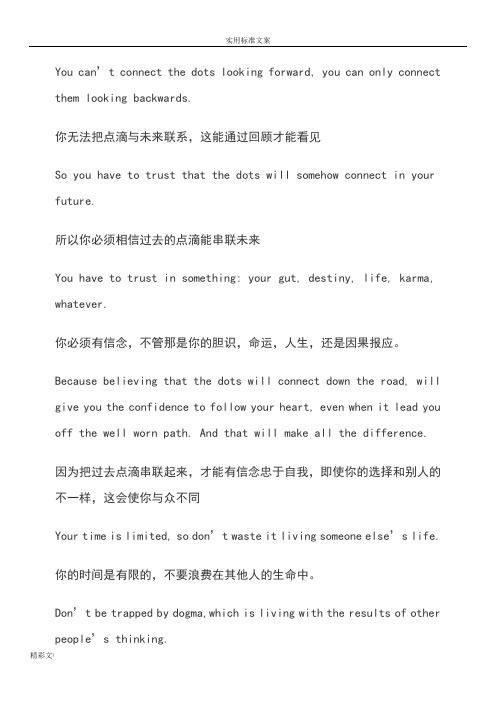
You can’t connect the dots looking forward, you can only connect them looking backwards.你无法把点滴与未来联系,这能通过回顾才能看见So you have to trust that the dots will somehow connect in your future.所以你必须相信过去的点滴能串联未来You have to trust in something: your gut, destiny, life, karma, whatever.你必须有信念,不管那是你的胆识,命运,人生,还是因果报应。
Because believing that the dots will connect down the road, will give you the confidence to follow your heart, even when it lead you off the well worn path. And that will make all the difference. 因为把过去点滴串联起来,才能有信念忠于自我,即使你的选择和别人的不一样,这会使你与众不同Your time is limited, so don’t waste it living someone else’s life. 你的时间是有限的,不要浪费在其他人的生命中。
Don’t be trapped by dogma,which is living with the results of other people’s thinking.别受教条约束,别活在其他人对你的期望之中,Don’t let the noise of others’ opinions drown out your own inner voice.You’ve got to find what you love.别让批评抹掉了你内心的声音,你得找到你所爱的东西And that is as true for your work as it is for your lovers.包括你热爱的事业和你的伴侣Your work is going to fill a large part of your life and the only way to be truly satisfied is to do what you believe is great work. 你的工作占据了你的大量时间,相信你做的工作是对的,才能发自内心的得到满足And the only way to do great work is to love what you do.只有爱你所做的事业才能成就不凡If you haven’t found it yet,keep looking, and don’t settle.如果你还没有找到,继续找,别安逸下来Have the courage to follow your heart and intuition, they somehow already know what you truly want to become.有勇气顺才自己的心和直觉,你的内心早晚就知道你未来的梦想You’re going to have some ups and you’re goning to have some downs. 但是你不可能一路顺遂Most people give up on themselves easily. You know the human spirit is powerful?!大多数人轻易放弃,但你知道人的意志有多坚强吗?There is nothing as powerful. It’s hard to kill the human spirit! 意志是无可比拟的坚强又富有韧性的!Anybody can feel good when they have their health, their bills are paid, they have happy relationships.任何人在财富,感情生活,健康良好的环境中,都能感到幸福,Anybody can be positive then,anybody can have a larger vision then,anybody can have faith under those kinds of circumstances. 任何人都能自得其满,任何人都能有伟大的理想,任何人在何样的环境下都能有信念The real challenge of growth, mentally, emotionally and spiritually comes when you get knocked down.It takes courage to act.真正的试验你的信念,信仰和意志,是当你被击倒的时候,其身而行需要有勇气,Part of being hungry when you have been defeated.被击到仍能谦虚,It takes courage to start over again.需要有勇气放下并重新开始。
英语短文阅读:史蒂夫乔布斯英文简介 Steve Jobs' English introduction
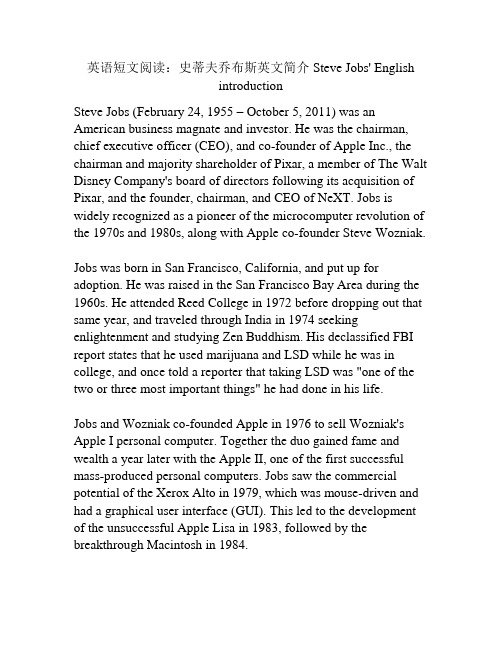
英语短文阅读:史蒂夫乔布斯英文简介 Steve Jobs' EnglishintroductionSteve Jobs (February 24, 1955 – October 5, 2011) was an American business magnate and investor. He was the chairman, chief executive officer (CEO), and co-founder of Apple Inc., the chairman and majority shareholder of Pixar, a member of The Walt Disney Company's board of directors following its acquisition of Pixar, and the founder, chairman, and CEO of NeXT. Jobs is widely recognized as a pioneer of the microcomputer revolution of the 1970s and 1980s, along with Apple co-founder Steve Wozniak.Jobs was born in San Francisco, California, and put up for adoption. He was raised in the San Francisco Bay Area during the 1960s. He attended Reed College in 1972 before dropping out that same year, and traveled through India in 1974 seeking enlightenment and studying Zen Buddhism. His declassified FBI report states that he used marijuana and LSD while he was in college, and once told a reporter that taking LSD was "one of the two or three most important things" he had done in his life.Jobs and Wozniak co-founded Apple in 1976 to sell Wozniak's Apple I personal computer. Together the duo gained fame and wealth a year later with the Apple II, one of the first successful mass-produced personal computers. Jobs saw the commercial potential of the Xerox Alto in 1979, which was mouse-driven and had a graphical user interface (GUI). This led to the development of the unsuccessful Apple Lisa in 1983, followed by the breakthrough Macintosh in 1984.。
StevenPaul乔布斯生平(中英文对照)
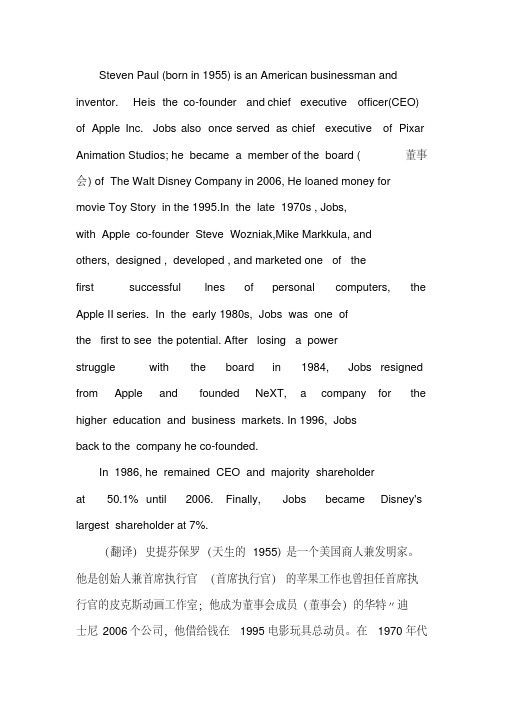
Steven Paul (born in 1955) is an American businessman and inventor. He i s the co-founder and chief executive officer(CEO) of Apple Inc. Jobs also once served as chief executive of Pixar Animation Studios; he became a member of the board (董事会) of The Walt Disney Company in 2006, He loaned money formovie Toy Story in the 1995.In the late 1970s , Jobs,with Apple co-founder Steve Wozniak,Mike Markkula, andothers, designed , developed , and marketed one of thefirst successful lnes of personal computers, the Apple II series. In the early 1980s, Jobs was one ofthe first to see the potential. After losing a powerstruggle with the board in 1984, Jobs resigned from Apple and founded NeXT, a company for the higher education and business markets. In 1996, Jobsback to the company he co-founded.In 1986, he remained CEO and majority shareholderat 50.1% until 2006. Finally, Jobs became Disney's largest shareholder at 7%.(翻译)史提芬保罗(天生的1955)是一个美国商人兼发明家。
史蒂夫·乔布斯演讲稿(中英对照)

这是苹果公司和Pixar动画工作室的CEO Steve Jobs于2005年6月12号在斯坦福大学的毕业典礼上面的演讲稿。
Thank you。
I’m honored to be with you today for your commencement from one of the finest universities in the world。
Truth be told,I never graduated from college and this is the closest I've ever gotten to a college graduation.谢谢大家。
很荣幸能和你们,来自世界最好大学之一的毕业生们,一块儿参加毕业典礼.老实说,我大学没有毕业,今天恐怕是我一生中离大学毕业最近的一次了。
Today I want to tell you three stories from my life。
That's it. No big deal。
Just three stories.今天我想告诉大家来自我生活的三个故事。
没什么大不了的,只是三个故事而已。
The first story is about connecting the dots。
第一个故事,如何串连生命中的点滴。
I dropped out of Reed College after the first six months but then stayed around as a drop-in for another 18 months or so before I really quit. So why did I drop out?It started before I was born。
My biological mother was a young, unwed graduate student, and she decided to put me up for adoption。
英汉双语阅读——史蒂夫·乔布斯——苹果的科技巨人
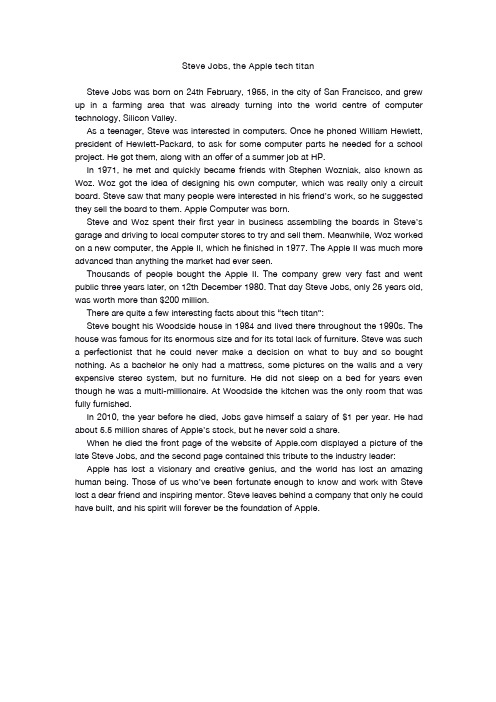
Steve Jobs,the Apple tech titanSteve Jobs was born on24th February,1955,in the city of San Francisco,and grew up in a farming area that was already turning into the world centre of computer technology,Silicon Valley.As a teenager,Steve was interested in computers.Once he phoned William Hewlett, president of Hewlett-Packard,to ask for some computer parts he needed for a school project.He got them,along with an offer of a summer job at HP.In1971,he met and quickly became friends with Stephen Wozniak,also known as Woz.Woz got the idea of designing his own computer,which was really only a circuit board.Steve saw that many people were interested in his friend’s work,so he suggested they sell the board to them.Apple Computer was born.Steve and Woz spent their first year in business assembling the boards in Steve’s garage and driving to local computer stores to try and sell them.Meanwhile,Woz worked on a new computer,the Apple II,which he finished in1977.The Apple II was much more advanced than anything the market had ever seen.Thousands of people bought the Apple II.The company grew very fast and went public three years later,on12th December1980.That day Steve Jobs,only25years old, was worth more than$200million.There are quite a few interesting facts about this“tech titan”:Steve bought his Woodside house in1984and lived there throughout the1990s.The house was famous for its enormous size and for its total lack of furniture.Steve was such a perfectionist that he could never make a decision on what to buy and so bought nothing.As a bachelor he only had a mattress,some pictures on the walls and a very expensive stereo system,but no furniture.He did not sleep on a bed for years even though he was a multi-millionaire.At Woodside the kitchen was the only room that was fully furnished.In2010,the year before he died,Jobs gave himself a salary of$1per year.He had about5.5million shares of Apple’s stock,but he never sold a share.When he died the front page of the website of displayed a picture of the late Steve Jobs,and the second page contained this tribute to the industry leader: Apple has lost a visionary and creative genius,and the world has lost an amazing human being.Those of us who’ve been fortunate enough to know and work with Steve lost a dear friend and inspiring mentor.Steve leaves behind a company that only he could have built,and his spirit will forever be the foundation of Apple.史蒂夫·乔布斯——苹果的科技巨人1955年2月24日,史蒂夫·乔布斯出生于旧金山。
乔布斯演讲稿英文版三篇

乔布斯演讲稿英文版三篇Speech 1: “Stay Hungry, Stay Foolish”Ladies and gentlemen,Thank you for being here today. I stand before you as a humble individual, but one who has been fortunate enough to witness the incredible power of technology in shaping our world. Today, I want to share with you a message that has guided me throughout my journey, and I hope it will inspire you too.“Stay hungry, stay foolish.”These words were famously uttered by the great Stewart Brand in his publication, The Whole Earth Catalog. They encapsulate a mindset that has driven me and countless others to push the boundaries of what is possible. It is the spirit of curiosity, of never settling for the status quo, that has propelled humanity forward. To stay hungry means to never lose that fire within us that drives us to seek knowledge, to innovate, and to explore new frontiers. It is this hunger that led me to co-found Apple, a company that has revolutionized the world of technology. But, it is not just about creating products; it is about creating experiences that enrich people’s lives.To stay foolish means to embrace our naivety, to not be limited by what others perceive as possible. It is this foolishness that allowed me to dream big and envision a world where technology is seamlessly integrated into our daily lives. It is this foolishness that led to the creation of the iPhone, a device that changed the way we communicate forever.But staying hungry and staying foolish is not just for the dreamers and the innovators. It is a message for all of us. It is a reminder that we should never stop learning, never stop questioning, and never stop pushing ourselves to be better. It is a reminder that we all have the power to make a difference.So, my message to you today is simple: stay hungry, stay foolish. Embrace your curiosity, embrace your dreams, and never be afraid to take risks. In doing so, you will not only shape your own future, but also the future of our world.Thank you.Speech 2: “The Power of Simplicity”Good evening, ladies and gentlemen,Today, I want to talk to you about the power of simplicity. In a world that is becoming increasingly complex, it is easy to get lost in the noise. But, it is simplicity that allows us to cut through the clutter and find clarity.At Apple, we have always believed in the power of simplicity. We strive to create products that are not only beautiful and elegant, but also intuitive and easy to use. We believe that technology should enhance our lives, not complicate them.But simplicity is not just about design; it is about mindset. It is about focusing on what truly matters and eliminating the unnecessary. It is about distilling complex ideas into simple concepts that everyone can understand.Steve Jobs once said, “Simple can be harder than complex: You have to work hard to get your thinking clean to make it simple. Butit’s worth it in the end because once you get there, you can move mountains.”And move mountains we did. We simplified the way we listen to music with the iPod, we simplified the way we communicate with the iPhone, and we simplified the way we interact with technology with the iPad. And we will continue to simplify, innovate, and push the boundaries of what is possible.But simplicity is not just about technology; it is a way of life. It is about decluttering our minds, our homes, and our lives. It is about finding joy in the simple pleasures and focusing on what truly matters.So, my message to you today is this: embrace simplicity. Look for ways to simplify your life, your work, and your relationships. Cut through the noise and find clarity. And remember, simplicity is not about taking away; it is about adding value.Thank you.Speech 3: “The Power of Failure”Good evening, ladies and gentlemen,Today, I want to talk to you about the power of failure. It may seem counterintuitive, but failure is not something to be feared; it is something to be embraced. It is through failure that we learn, grow, and ultimately succeed.Throughout my career, I have faced numerous setbacks and failures. But it is these experiences that have shaped me into the person I am today. It is through failure that I have gained resilience, determination, and the ability to persevere.One of Apple’s most famous failures was the Apple Lisa. It was a commercial failure, but it laid the groundwork for the Macintosh, which went on to become one of the most successful products in Apple’s history. It is a reminder that failure is not the end; it is just a stepping stone on the path to success.Failure also teaches us humility. It reminds us that we are not infallible, that we make mistakes, and that we can always learn and improve. It is through failure that we gain the wisdom and experience to make better decisions in the future.But perhaps most importantly, failure fuels innovation. It is through failure that we discover new ideas, new approaches, and new solutions. It is through failure that we push the boundaries of what is possible and create breakthroughs that change the world. So, my message to you today is this: embrace failure. Don’t be afraid to take risks, to step outside of your comfort zone, and to try new things. Learn from your failures, grow from your setbacks, and let them propel you forward.Remember, failure is not the end; it is just the beginning of a new chapter. It is through failure that we find success.Thank you.。
stevejobs生平简介英文翻译

steve jobs生平简介英文翻译Steve Jobs, born on February 24, 1955, was an American business magnate, industrial designer, and inventor. He is best known as the co-founder, chairman, and CEO of Apple Inc, a company that revolutionized the technology industry with its innovative products and designs。
Jobs was born and raised in San Francisco, California. He was adopted by Paul and Clara Jobs, who encouraged his interest in electronics from a young age. In high school, he attended the Homestead High School in Cupertino, California. It was during his time there that he met Steve Wozniak, a fellow electronics enthusiast and future co-founder of Apple。
After graduating from high school, Jobs enrolled at Reed College in Portland, Oregon. However, he dropped out after just six months because he didn't see the value in spending his parents' hard-earned money on formal education. Instead, he continued attending classes thatinterested him, such as calligraphy, which later influenced the typography of Apple's products。
乔布斯英文介绍!!超经典!!
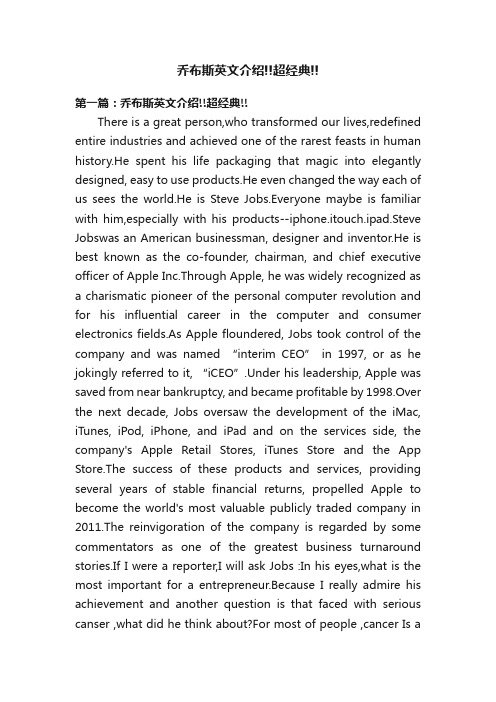
乔布斯英文介绍!!超经典!!第一篇:乔布斯英文介绍!!超经典!!There is a great person,who transformed our lives,redefined entire industries and achieved one of the rarest feasts in human history.He spent his life packaging that magic into elegantly designed, easy to use products.He even changed the way each of us sees the world.He is Steve Jobs.Everyone maybe is familiar with him,especially with his products--iphone.itouch.ipad.Steve Jobswas an American businessman, designer and inventor.He is best known as the co-founder, chairman, and chief executive officer of Apple Inc.Through Apple, he was widely recognized as a charismatic pioneer of the personal computer revolution and for his influential career in the computer and consumer electronics fields.As Apple floundered, Jobs took control of the company and was named “interim CEO” in 1997, or as he jokingly referred to it, “iCEO”.Under his leadership, Apple was saved from near bankruptcy, and became profitable by 1998.Over the next decade, Jobs oversaw the development of the iMac, iTunes, iPod, iPhone, and iPad and on the services side, the company's Apple Retail Stores, iTunes Store and the App Store.The success of these products and services, providing several years of stable financial returns, propelled Apple to become the world's most valuable publicly traded company in 2011.The reinvigoration of the company is regarded by some commentators as one of the greatest business turnaround stories.If I were a reporter,I will ask Jobs :In his eyes,what is the most important for a entrepreneur.Because I really admire his achievement and another question is that faced with serious canser ,what did he think about?For most of people ,cancer Is aacute attack to one’s mental and heart ,but Jobs lead Apple to the climax.The reason that I want to introduce Steve Jobs is not only because the enormous acomplish,but also because his great personality.The Economisist says:” NOBODY else in the computer industry could put on a show like Steve Jobs.His product launches, at which he would stand alone on a black stage and conjure up a “magical” or “incredible” new electronic gadget in front of an awed crowd, were the performances of a master showman.All computers do is to do something about c auculation, but do it fast enough and “the results appear to be magic”, he once explained.He spent his life packaging that magic into elegantly designed, easy to useproducts.”In retrospect, Mr Jobs was a man ahead of his time during his first stint at Ap puting’s early years were dominated by technical types.But his emphasis on design and ease of use gave him the edge later on.Elegance, simplicity and an understanding of other fields came to matter in a world in which computers are fashion items, carried by everyone, that can do almost anything.“Technology alone is not enough,” said Mr Jobs at the end of his speech introducing the iPad, in January 2010.“It’s technology married with liberal arts, married with humanities, that yields the results that m ake our hearts sing.” It was an unusual statement for the head of a technology firm, but it was vintage Steve Jobs.He attributed his success to an obsessive attention to detail , his pursuit of perfection and his flair for innovation.He said-“I want to mak e icons do look lick with his tongue”;To be able to sleep at night, to the aesthetic and quality throughout the pursuit of excellence“"Do not let the noise of others opinions drown your inner voice, heart andintuition to have the courage to listen to the call.”-He is Apple's “The Godfather” Jobs.“A pirate, a paranoid, a perfect combination of art and technology of IT leaders, a person who changed the world.” He said in his youth that he wanted to “put a ding in the universe” did just that.到目前为止,世界上还没有哪个计算机行业或者其他任何行业的领袖能够像乔布斯那样举办出一场万众瞩目的盛会。
史蒂夫乔布斯的英语简介英文介绍

史蒂夫乔布斯的英语简介英文介绍通过以下的中英文简介,你是不是也对乔布斯简介有了更深入的了解了呢?以下是店铺给大家带来史蒂夫乔布斯的英语介绍,供大家参阅!史蒂夫乔布斯的英语简介Steven Paul Jobs (English: Steven Paul Jobs, February 24, 1955 - October 5, 2011), referred to as Steve Jobs (English: Steve Jobs, the co-founder of apple, and apple's board chairman, former chief operating officer, and former chairman and chief executive of pixar animation studios (pixar animation studios has been acquired by Disney in 2006 ). Jobs also was a board member of the Disney company and the largest individual shareholder . Steve jobs is considered to be the computer industry and entertainment industry icon, at the same time, the people also regarded him as Macintosh computer, iPod, iTunes Store, iPhone, tablet, etc. The founder of the famous digital products . In 2007, Steve jobs was "fortune" magazine named the year's most powerful businessmen .Jobs's career has greatly affected the legendary silicon valley venture entrepreneur, he will be the design concept of aesthetics is the highest in the world. His praise highly of simple and convenient design won him many devoted followers . Steve jobs and wozniak jointly make personal computers in the late 70 s to the early 80 s, he was also the first person to see the commercial potential of mouse . Steve jobs in 1985 apple high-level power struggle to leave and set up the NeXT, aimed at professional market. In 1997, apple bought NeXT, jobs returned to apple took over as chief executive. On August 24, 2011, Mr. Jobs announced his resignation as apple's chief executive, died on October 5, forwith pancreatic cancer , 56 years old have to .史蒂夫乔布斯的中英文简介Steven Paul "Steve" Jobs (February 24, 1955 –October 5, 2011) was an American businessman, designer and inventor. He is best known as the co-founder, chairman, and chief executive officer of Apple Inc. Through Apple, he was widely recognized as a charismatic pioneer of the personal computer revolution and for his influential career in the computer and consumer electronics fields.史蒂芬•保罗•乔布斯,通称史蒂夫•乔布斯,(1955年2月24日-2011年10月5日),是美国商业巨子,设计家和发明家。
伟人乔布斯_中英文介绍
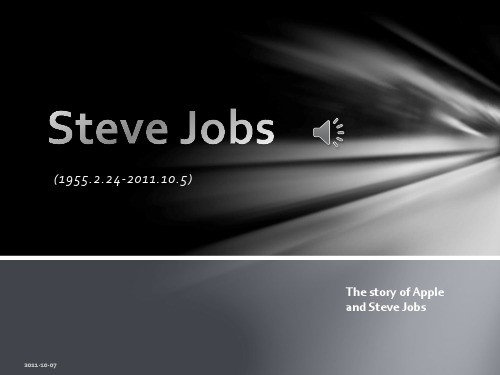
Evaluate评价
His pursuit of the details - "I want to make icons do look lick with his tongue"; his pursuit of perfection - "To be able to sleep at night, to the aesthetic and quality throughout the pursuit of excellence"; His flair for innovation - "Do not let the noise of others opinions drown your inner voice, heart and intuition to have the courage to listen to the call." - He is Apple's "The Godfather" Jobs. "A pirate, a paranoid, a perfect combination of art and technology of IT leaders, a person who changed the world."
End of life生命尾声
August 24, 2011, Jobs resigned from the post of CEO. Local time on October 5, 2011, died aged 56. 2011年8月24日,乔布斯辞去CEO一职。于当地 时间2011年10月5日逝世,终年56岁。
史蒂夫 乔布斯(中英对照)

史蒂夫•乔布斯(1955-2011)10月5日,星期三,史蒂夫•乔布斯与世长辞,享年56岁。
乔布斯永远地改变了我们认知科技、应用科技的方式,在横跨个人电脑到音乐产业的广泛领域都打上自己鲜明的烙印。
在此,《财富》杂志(Fortune)将逐一回顾他留给我们的10大遗产。
Steve Jobs (1955-2011)Steve Jobs passed away Wednesday, Oct. 5 at age 56. Fortune looks back at how he changed the way we think about and use technology forever, putting his own stamp on everything from the personal computer to the music industry.设计在史蒂夫眼中,产品的外观、手感和操作远远超过纯粹的技术规格。
PC制造商还在追逐更快的处理器速度,而乔布斯却在追求更加智能、简单灵巧的设计。
苹果公司(Apple)一位前任员工回忆起乔布斯曾经有一次在公司召开的会议上认真思索Mini Cooper 的魅力所在。
(他的一位同事当时正在销售这款汽车。
)他回忆道:“最后,他得出的结论是,这款汽车之所以炫酷出众,正是因为它小巧玲珑。
史蒂夫认为,当时正是苹果公司充分利用金属材料的最佳时机。
当时,大部分电脑制造商仍在使用塑料,但他认为,要想使电脑更加小巧,必须很好地利用金属材料。
”这一举措最终带来了回报:苹果公司的钛铝合金笔记本电脑备受追捧。
最近推出的MacBook Air型号笔记本也被视为设计、价格与性能三者完美结合的典范。
DesignFor Jobs, how a product looked, felt and responded trumped raw technical specifications. While PC makers chased after faster processor speeds, Jobs pursued clever, minimalist design.One ex-Apple employee remembers sitting in a meeting with Jobs, who was mulling over the appeal of Mini Coopers. (An old coworker of his sold them at the time.)"He finally decided they were cool because they were small," he says. "Steve said that's when he knew Apple had to get really good at metal. Most computer makers at the time were all using plastic, but he knew to get smaller, you had to get metal really, really well."The move paid off: Apple's titanium-turned-aluminum notebooks became bestsellers. The most recent MacBook Air models have been held up as examples of the ideal intersection of design, price and performance.音乐进入新千年以来,音乐产业迅速向数字内容传递方式转变,上百万用户通过Napster等在线音乐服务网站非法下载音乐,这种混乱局面使得音乐出版公司MusicThe new millennium was all about a rapid shift to digital content delivery, a disruption that sent music publishers scrambling to preserve their疲于应付,只能在日益调低底线的痛苦中苦苦挣扎。
(完整版)乔布斯中英文简介
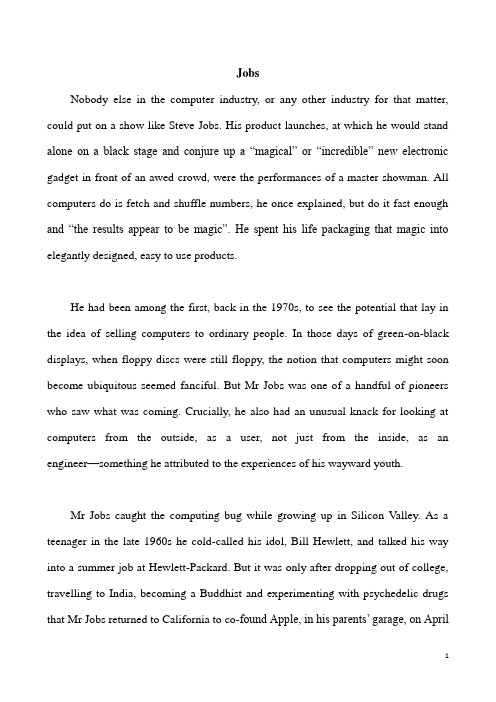
JobsNobody else in the computer industry, or any other industry for that matter, could put on a show like Steve Jobs. His product launches, at which he would stand alone on a black stage and conjure up a “magical” or “incredible” new electronic gadget in front of an awed crowd, were the performances of a master showman. All computers do is fetch and shuffle numbers, he once explained, but do it fast enough and “the results appear to be magic”. He spent his life packaging that magic into elegantly designed, easy to use products.He had been among the first, back in the 1970s, to see the potential that lay in the idea of selling computers to ordinary people. In those days of green-on-black displays, when floppy discs were still floppy, the notion that computers might soon become ubiquitous seemed fanciful. But Mr Jobs was one of a handful of pioneers who saw what was coming. Crucially, he also had an unusual knack for looking at computers from the outside, as a user, not just from the inside, as an engineer—something he attributed to the experiences of his wayward youth.Mr Jobs caught the computing bug while growing up in Silicon Valley. As a teenager in the late 1960s he cold-called his idol, Bill Hewlett, and talked his way into a summer job at Hewlett-Packard. But it was only after dropping out of college, travelling to India, becoming a Buddhist and experimenting with psychedelic drugs that Mr Jobs returned to California to co-found Apple, in his parents’ garage, on AprilFools’ Day 1976. “A lot of people in our industry haven’t had very diverse experiences,” he once said. “So they don’t have enough dots to connect, and they end up with very linear solutions.” Bill Gates, he suggested, would be “a broader guy if he had dropped acid once or gone off to an ashram when he was younger”.Dropping out of his college course and attending calligraphy classes instead had, for example, given Mr Jobs an apparently useless love of typography. But support for a variety of fonts was to prove a key feature of the Macintosh, the pioneering mouse-driven, graphical computer that Apple launched in 1984. With its windows, icons and menus, it was sold as “the computer for the rest of us”. Having made a fortune from Apple’s initial success, Mr Jobs expected to sell “zillions” of his new machines. But the Mac was not the mass-market success Mr Jobs had hoped for, and he was ousted from Apple by its board.Yet this apparently disastrous turn of events turned out to be a blessing: “the best thing that could have ever happened to me”, Mr Jobs later called it. He co-founded a new firm, Pixar, which specialised in computer graphics, and NeXT, another computer-maker. His remarkable second act began in 1996 when Apple, having lost its way, acquired NeXT, and Mr Jobs returned to put its technology at the heart of a new range of Apple products. And the rest is history: Apple launched the iMac, the iPod, the iPhone and the iPad, and (briefly) became the world’s most valuable listed company. “I’m pretty sure none of this would have happened if Ihadn’t been fired from Apple,” Mr Jobs said in 2005. When his failing health forced him to step down as Apple’s boss in 2011, he was hailed as the greatest chief executive in history. Oh, and Pixar, his side project, produced a string of hugely successful animated movies.In retrospect, Mr Jobs was a man ahead of his time during his first stint at Apple. Computing’s early years were dominated by technical types. But his emphasis on design and ease of use gave him the edge later on. Elegance, simplicity and an understanding of other fields came to matter in a world in which computers are fashion items, carried by everyone, tha t can do almost anything. “Technology alone is not enough,” said Mr Jobs at the end of his speech introducing the iPad, in January 2010. “It’s technology married with liberal arts, married with humanities, that yields the results that make our hearts sing.” It was an unusual statement for the head of a technology firm, but it was vintage Steve Jobs.His interdisciplinary approach was backed up by an obsessive attention to detail.A carpenter making a fine chest of drawers will not use plywood on the back, even though nobody will see it, he said, and he applied the same approach to his products. “For you to sleep well at night, the aesthetic, the quality, has to be carried all the way through.” He insisted that the first Macintosh should have no internal c ooling fan, so that it would be silent—putting user needs above engineering convenience. He called an Apple engineer one weekend with an urgent request: the colour of one letterof an on-screen logo on the iPhone was not quite the right shade of yellow. He often wrote or rewrote the text of Apple’s advertisements himself.His on-stage persona as a Zen-like mystic notwithstanding, Mr Jobs was an autocratic manager with a fierce temper. But his egomania was largely justified. He eschewed market researchers and focus groups, preferring to trust his own instincts when evaluat ing potential new products. “A lot of times, people don’t know what they want until you show it to them,” he said. His judgment proved uncannily accurate: by the end of his career the hits far outweighed the misses. Mr Jobs was said by an engineer in the early years of Apple to emit a “reality distortion field”, such were his powers of persuasion. But in the end he changed reality, channelling the magic of computing into products that reshaped music, telecoms and media. The man who said in his youth that he wanted to “put a ding in the universe” did just that.以下为中文评论全文:到目前为止,世界上还没有哪个计算机行业或者其他任何行业的领袖能够像乔布斯那样举办出一场万众瞩目的盛会。
(完整版)乔布斯中英文简介

JobsNobody else in the computer industry, or any other industry for that matter, could put on a show like Steve Jobs. His product launches, at which he would stand alone on a black stage and conjure up a “magical” or “incredible” new electronic gadget in front of an awed crowd, were the performances of a master showman. All computers do is fetch and shuffle numbers, he once explained, but do it fast enough and “the results appear to be magic”. He spent his life packaging that magic into elegantly designed, easy to use products.He had been among the first, back in the 1970s, to see the potential that lay in the idea of selling computers to ordinary people. In those days of green-on-black displays, when floppy discs were still floppy, the notion that computers might soon become ubiquitous seemed fanciful. But Mr Jobs was one of a handful of pioneers who saw what was coming. Crucially, he also had an unusual knack for looking at computers from the outside, as a user, not just from the inside, as an engineer—something he attributed to the experiences of his wayward youth.Mr Jobs caught the computing bug while growing up in Silicon Valley. As a teenager in the late 1960s he cold-called his idol, Bill Hewlett, and talked his way into a summer job at Hewlett-Packard. But it was only after dropping out of college, travelling to India, becoming a Buddhist and experimenting with psychedelic drugs that Mr Jobs returned to California to co-found Apple, in his parents’ garage, on AprilFools’ Day 1976. “A lot of people in our industry haven’t had very diverse experiences,” he once said. “So they don’t have enough dots to connect, and they end up with very linear solutions.” Bill Gates, he suggested, would be “a broader guy if he had dropped acid once or gone off to an ashram when he was younger”.Dropping out of his college course and attending calligraphy classes instead had, for example, given Mr Jobs an apparently useless love of typography. But support for a variety of fonts was to prove a key feature of the Macintosh, the pioneering mouse-driven, graphical computer that Apple launched in 1984. With its windows, icons and menus, it was sold as “the computer for the rest of us”. Having made a fortune from Apple’s initial success, Mr Jobs expected to sell “zillions” of his new machines. But the Mac was not the mass-market success Mr Jobs had hoped for, and he was ousted from Apple by its board.Yet this apparently disastrous turn of events turned out to be a blessing: “the best thing that could have ever happened to me”, Mr Jobs later called it. He co-founded a new firm, Pixar, which specialised in computer graphics, and NeXT, another computer-maker. His remarkable second act began in 1996 when Apple, having lost its way, acquired NeXT, and Mr Jobs returned to put its technology at the heart of a new range of Apple products. And the rest is history: Apple launched the iMac, the iPod, the iPhone and the iPad, and (briefly) became the world’s most valuable listed company. “I’m pretty sure none of this would have happened if Ihadn’t been fired from Apple,” Mr Jobs said in 2005. When his failing health forced him to step down as Apple’s boss in 2011, he was hailed as the greatest chief executive in history. Oh, and Pixar, his side project, produced a string of hugely successful animated movies.In retrospect, Mr Jobs was a man ahead of his time during his first stint at Apple. Computing’s early years were dominated by technical types. But his emphasis on design and ease of use gave him the edge later on. Elegance, simplicity and an understanding of other fields came to matter in a world in which computers are fashion items, carried by everyone, tha t can do almost anything. “Technology alone is not enough,” said Mr Jobs at the end of his speech introducing the iPad, in January 2010. “It’s technology married with liberal arts, married with humanities, that yields the results that make our hearts sing.” It was an unusual statement for the head of a technology firm, but it was vintage Steve Jobs.His interdisciplinary approach was backed up by an obsessive attention to detail.A carpenter making a fine chest of drawers will not use plywood on the back, even though nobody will see it, he said, and he applied the same approach to his products. “For you to sleep well at night, the aesthetic, the quality, has to be carried all the way through.” He insisted that the first Macintosh should have no internal c ooling fan, so that it would be silent—putting user needs above engineering convenience. He called an Apple engineer one weekend with an urgent request: the colour of one letterof an on-screen logo on the iPhone was not quite the right shade of yellow. He often wrote or rewrote the text of Apple’s advertisements himself.His on-stage persona as a Zen-like mystic notwithstanding, Mr Jobs was an autocratic manager with a fierce temper. But his egomania was largely justified. He eschewed market researchers and focus groups, preferring to trust his own instincts when evaluat ing potential new products. “A lot of times, people don’t know what they want until you show it to them,” he said. His judgment proved uncannily accurate: by the end of his career the hits far outweighed the misses. Mr Jobs was said by an engineer in the early years of Apple to emit a “reality distortion field”, such were his powers of persuasion. But in the end he changed reality, channelling the magic of computing into products that reshaped music, telecoms and media. The man who said in his youth that he wanted to “put a ding in the universe” did just that.以下为中文评论全文:到目前为止,世界上还没有哪个计算机行业或者其他任何行业的领袖能够像乔布斯那样举办出一场万众瞩目的盛会。
史蒂夫乔布斯(中英对照)
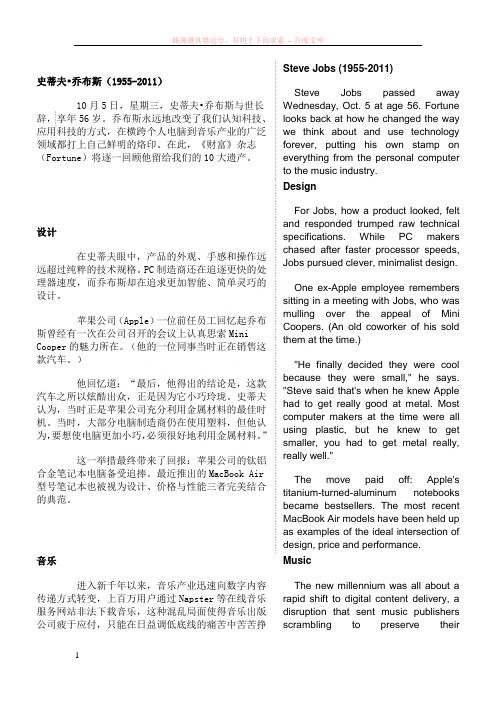
史蒂夫•乔布斯(1955-2011)10月5日,星期三,史蒂夫•乔布斯与世长辞,享年56岁。
乔布斯永远地改变了我们认知科技、应用科技的方式,在横跨个人电脑到音乐产业的广泛领域都打上自己鲜明的烙印。
在此,《财富》杂志(Fortune)将逐一回顾他留给我们的10大遗产。
Steve Jobs (1955-2011)Steve Jobs passed away Wednesday, Oct. 5 at age 56. Fortune looks back at how he changed the way we think about and use technology forever, putting his own stamp on everything from the personal computer to the music industry.设计在史蒂夫眼中,产品的外观、手感和操作远远超过纯粹的技术规格。
PC制造商还在追逐更快的处理器速度,而乔布斯却在追求更加智能、简单灵巧的设计。
苹果公司(Apple)一位前任员工回忆起乔布斯曾经有一次在公司召开的会议上认真思索Mini Cooper的魅力所在。
(他的一位同事当时正在销售这款汽车。
)他回忆道:“最后,他得出的结论是,这款汽车之所以炫酷出众,正是因为它小巧玲珑。
史蒂夫认为,当时正是苹果公司充分利用金属材料的最佳时机。
当时,大部分电脑制造商仍在使用塑料,但他认为,要想使电脑更加小巧,必须很好地利用金属材料。
”这一举措最终带来了回报:苹果公司的钛铝合金笔记本电脑备受追捧。
最近推出的MacBook Air 型号笔记本也被视为设计、价格与性能三者完美结合的典范。
DesignFor Jobs, how a product looked, felt and responded trumped raw technical specifications. While PC makers chased after faster processor speeds, Jobs pursued clever, minimalist design.One ex-Apple employee remembers sitting in a meeting with Jobs, who was mulling over the appeal of Mini Coopers. (An old coworker of his sold them at the time.)"He finally decided they were cool because they were small," he says. "Steve said that's when he knew Apple had to get really good at metal. Most computer makers at the time were all using plastic, but he knew to get smaller, you had to get metal really, really well."The move paid off: Apple's titanium-turned-aluminum notebooks became bestsellers. The most recent MacBook Air models have been held up as examples of the ideal intersection of design, price and performance.音乐进入新千年以来,音乐产业迅速向数字内容传递方式转变,上百万用户通过Napster等在线音乐服务网站非法下载音乐,这种混乱局面使得音乐出版公司疲于应付,只能在日益调低底线的痛苦中苦苦挣MusicThe new millennium was all about a rapid shift to digital content delivery, a disruption that sent music publishers scrambling to preserve their扎。
乔布斯中英文wiki简介

史蒂芬·保罗·乔布斯(英语:Steven Paul Jobs,1955年2月24日-2011年10月5日),简称为史蒂夫·乔布斯(英语:Steve Jobs),苹果公司的创办人之一,并曾任苹果公司的董事会主席、首席运行官,同时也是前皮克斯动画工作室的董事长及首席执行官(皮克斯动画工作室已于2006年被迪士尼收购[3])。
乔布斯还曾是迪士尼公司的董事会成员和最大个人股东[9]。
乔布斯被认为是电脑业界与娱乐业界的标志性人物,同时人们也把他视作麦金塔电脑、iPod、iTunes Store、iPhone、iPad等知名数字产品的缔造者[10]。
2007年,史蒂夫·乔布斯被《财富》杂志评为了年度最强有力商人[11]。
乔布斯的生涯极大地影响了硅谷风险创业的传奇,他将美学至上的设计理念在全世界推广开来。
他对简约及便利设计的推崇为他赢得了许多忠实追随者[12]。
乔布斯与沃兹尼亚克共同使个人电脑在70年代末至80年代初流行开来,他也是第一个看到鼠标的商业潜力的人[13]。
乔布斯在1985年苹果高层权力斗争中离开苹果并成立了NeXT公司,瞄准专业市场。
1997年,苹果收购NeXT,乔布斯回到苹果接任首席执行官。
2011年8月24日,乔布斯宣布辞去苹果首席执行官职务,10月5日因身患胰腺癌去世,享年56岁[14]。
Steven Paul"Steve" Jobs(February 24, 1955 –October 5, 2011)[2][6][7]was an American computer entrepreneur and inventor. He was co-founder,[8] chairman, and chief executive officer of Apple Inc.[9][10] Jobs also previously served as chief executive of Pixar Animation Studios; he became a member of the board of directors of The Walt Disney Company in 2006, following the acquisition of Pixar by Disney. He was credited in Toy Story (1995) as an executive producer.[11]In the late 1970s, Jobs, with Apple co-founder Steve Wozniak, Mike Markkula[8]and others designed, developed, and marketed one of the first commercially successful lines of personal computers, the Apple II series. In the early 1980s, Jobs was among the first to see the commercial potential of Xerox PARC's mouse-driven graphical user interface, which led to the creation of the Macintosh.[12][13] After losing a power struggle with the board of directors in 1985,[14][15] Jobs resigned from Apple and founded NeXT, a computer platform development company specializing in the higher-education and business markets. Apple's subsequent 1996 buyout of NeXT brought Jobs back to the company he co-founded, and he served as its CEO from 1997 until 2011.In 1986, he acquired the computer graphics division of Lucasfilm Ltd which was spun off as Pixar Animation Studios.[16] He remained CEO and majority shareholder at 50.1 percent until its acquisition by The Walt Disney company in 2006.[17]Consequently Jobs became Disney's largest individual shareholder at 7 percent and a member of Disney's Board of Directors.[18][19] On August 24, 2011, Jobs announced his resignation from his role as Apple's CEO.On October 5, 2011, Apple announced that Jobs had died.[20][21][22] He was 56 years old.。
史蒂夫·乔布斯演讲稿(中英对照)
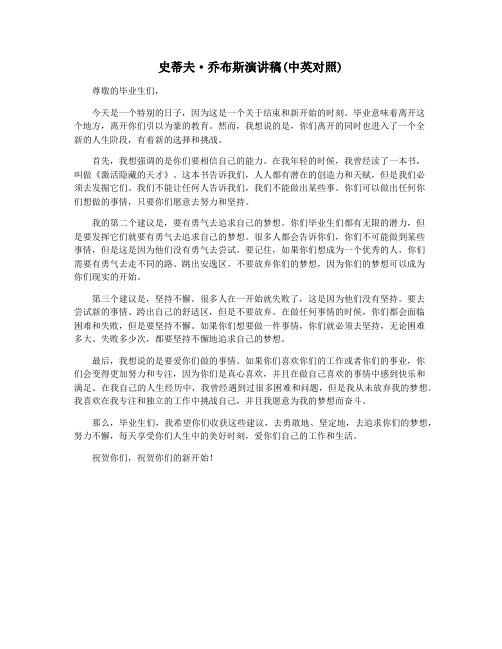
史蒂夫·乔布斯演讲稿(中英对照)尊敬的毕业生们,今天是一个特别的日子,因为这是一个关于结束和新开始的时刻。
毕业意味着离开这个地方,离开你们引以为豪的教育。
然而,我想说的是,你们离开的同时也进入了一个全新的人生阶段,有着新的选择和挑战。
首先,我想强调的是你们要相信自己的能力。
在我年轻的时候,我曾经读了一本书,叫做《激活隐藏的天才》。
这本书告诉我们,人人都有潜在的创造力和天赋,但是我们必须去发掘它们。
我们不能让任何人告诉我们,我们不能做出某些事。
你们可以做出任何你们想做的事情,只要你们愿意去努力和坚持。
我的第二个建议是,要有勇气去追求自己的梦想。
你们毕业生们都有无限的潜力,但是要发挥它们就要有勇气去追求自己的梦想。
很多人都会告诉你们,你们不可能做到某些事情,但是这是因为他们没有勇气去尝试。
要记住,如果你们想成为一个优秀的人,你们需要有勇气去走不同的路、跳出安逸区。
不要放弃你们的梦想,因为你们的梦想可以成为你们现实的开始。
第三个建议是,坚持不懈。
很多人在一开始就失败了,这是因为他们没有坚持。
要去尝试新的事情、跨出自己的舒适区,但是不要放弃。
在做任何事情的时候,你们都会面临困难和失败,但是要坚持不懈。
如果你们想要做一件事情,你们就必须去坚持,无论困难多大、失败多少次,都要坚持不懈地追求自己的梦想。
最后,我想说的是要爱你们做的事情。
如果你们喜欢你们的工作或者你们的事业,你们会变得更加努力和专注,因为你们是真心喜欢,并且在做自己喜欢的事情中感到快乐和满足。
在我自己的人生经历中,我曾经遇到过很多困难和问题,但是我从未放弃我的梦想。
我喜欢在我专注和独立的工作中挑战自己,并且我愿意为我的梦想而奋斗。
那么,毕业生们,我希望你们收获这些建议,去勇敢地、坚定地,去追求你们的梦想,努力不懈,每天享受你们人生中的美好时刻,爱你们自己的工作和生活。
祝贺你们,祝贺你们的新开始!。
乔布斯生平简介(中英文对照)精编版
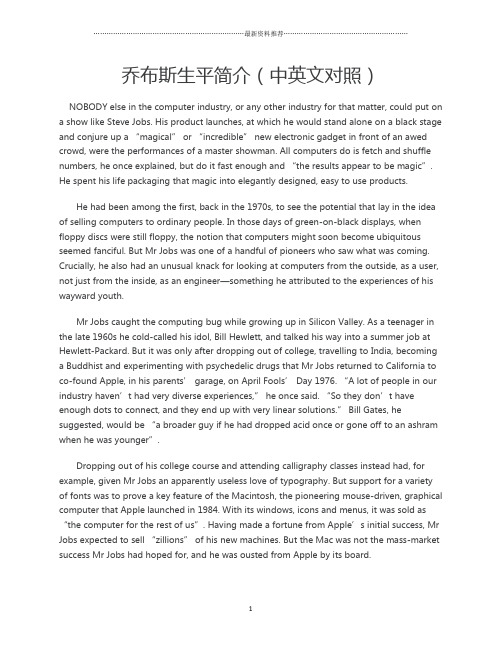
乔布斯生平简介(中英文对照)NOBODY else in the computer industry, or any other industry for that matter, could put on a show like Steve Jobs. His product launches, at which he would stand alone on a black stage and conjure up a “magical” or “incredible” new electronic gadget in front of an awed crowd, were the performances of a master showman. All computers do is fetch and shuffle numbers, he once explained, but do it fast enough and “the results appear to be magic”. He spent his life packaging that magic into elegantly designed, easy to use products.He had been among the first, back in the 1970s, to see the potential that lay in the idea of selling computers to ordinary people. In those days of green-on-black displays, when floppy discs were still floppy, the notion that computers might soon become ubiquitous seemed fanciful. But Mr Jobs was one of a handful of pioneers who saw what was coming. Crucially, he also had an unusual knack for looking at computers from the outside, as a user, not just from the inside, as an engineer—something he attributed to the experiences of his wayward youth.Mr Jobs caught the computing bug while growing up in Silicon Valley. As a teenager in the late 1960s he cold-called his idol, Bill Hewlett, and talked his way into a summer job at Hewlett-Packard. But it was only after dropping out of college, travelling to India, becoming a Buddhist and experimenting with psychedelic drugs that Mr Jobs returned to California to co-found Apple, in his parents’ garage, on April Fools’ Day 1976. “A lot of people in our industry haven’t had very diverse experiences,” he once said. “So they don’t have enough dots to connect, and they end up with very linear solutions.” Bill Gates, he suggested, would be “a broader guy if he had dropped acid once or gone off to an ashram when he was younger”.Dropping out of his college course and attending calligraphy classes instead had, for example, given Mr Jobs an apparently useless love of typography. But support for a variety of fonts was to prove a key feature of the Macintosh, the pioneering mouse-driven, graphical computer that Apple launched in 1984. With its windows, icons and menus, it was sold as “the computer for the rest of us”. Having made a fortune from Apple’s initial success, Mr Jobs expected to sell “zillions” of his new machines. But the Mac was not the mass-market success Mr Jobs had hoped for, and he was ousted from Apple by its board.Yet this apparently disastrous turn of events turned out to be a blessing: “the best thing that could have ever happened to me”, Mr Jobs later called it. He co-founded a new firm, Pixar, which specialised in computer graphics, and NeXT, another computer-maker. His remarkable second act began in 1996 when Apple, having lost its way, acquired NeXT, and Mr Jobs returned to put its technology at the heart of a new range of Apple products. And the rest is history: Apple launched the iMac, the iPod, the iPhone and the iPad, and (briefly) became the world’s most valuable listed company. “I’m pretty sure none of this would have happened if I hadn’t been fired from Apple,” Mr Jobs said in 2005. When his failing health forced him to step down as Apple’s boss in 2011, he was hailed as the greatest chief executive in history. Oh, and Pixar, his side project, produced a string of hugely successful animated movies.In retrospect, Mr Jobs was a man ahead of his time during his first stint at Apple. Computing’s early years were dominated by technical types. But his emphasis on design and ease of use gave him the edge later on. Elegance, simplicity and an understanding of other fields came to matter in a world in which computers are fashion items, carried by everyone, that can do almost anything. “Technology alone is not enough,” said Mr Jobs at the end of his speech introducing the iPad, in January 2010. “It’s technology married with liberal arts, married with humanities, that yields the results that make our hearts sing.” It was an unusual statement for the head of a technology firm, but it was vintage Steve Jobs.His interdisciplinary approach was backed up by an obsessive attention to detail. A carpenter making a fine chest of drawers will not use plywood on the back, even though nobody will see it, he said, and he applied the same approach to his products. “For you to sleep well at night, the aesthetic, the quality, has to be carried all the way through.” He insisted that the first Macintosh should have no internal cooling fan, so that it would be silent—putting user needs above engineering convenience. He called an Apple engineer one weekend with an urgent request: the colour of one letter of an on-screen logo on the iPhone was not quite the right shade of yellow. He often wrote or rewrote the text of Apple’s advertisements himself.His on-stage persona as a Zen-like mystic notwithstanding, Mr Jobs was an autocratic manager with a fierce temper. But his egomania was largely justified. He eschewed market researchers and focus groups, preferring to trust his own instincts when evaluating potential new products. “A lot of times, people don’t know what they want until you show it to them,” he said. His judgment proved uncannily accurate: by the end of his career the hitsfar outweighed the misses. Mr Jobs was said by an engineer in the early years of Apple to emit a “reality distortion field”, such were his powers of persuasion. But in the end he changed reality, channelling the magic of computing into products that reshaped music, telecoms and media. The man who said in his youth that he wanted to “put a ding in the universe” did just that.以下为中文评论全文:到目前为止,世界上还没有哪个计算机行业或者其他任何行业的领袖能够像乔布斯那样举办出一场万众瞩目的盛会。
Steven Paul乔布斯生平(中英文对照)
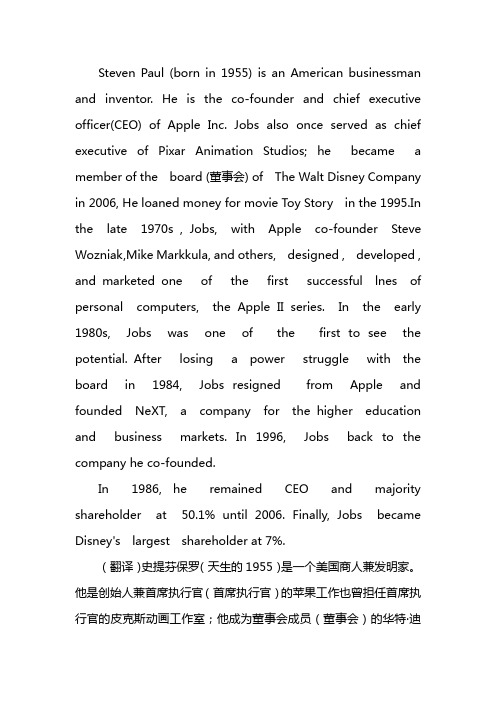
Steven Paul (born in 1955) is an American businessman and inventor. He is the co-founder and chief executive officer(CEO) of Apple Inc. Jobs also once served as chief executive of Pixar Animation Studios; he became a member of the board (董事会) of The Walt Disney Company in 2006, He loaned money for movie Toy Story in the 1995.In the late 1970s , Jobs, with Apple co-founder Steve Wozniak,Mike Markkula, and others, designed , developed , and marketed one of the first successful lnes of personal computers, the Apple II series. In the early 1980s, Jobs was one of the first to see the potential. After losing a power struggle with the board in 1984, Jobs resigned from Apple and founded NeXT, a company for the higher education and business markets. In 1996, Jobs back to the company he co-founded.In 1986, he remained CEO and majority shareholder at 50.1% until 2006. Finally, Jobs became Disney's largest shareholder at 7%.(翻译)史提芬保罗(天生的1955)是一个美国商人兼发明家。
- 1、下载文档前请自行甄别文档内容的完整性,平台不提供额外的编辑、内容补充、找答案等附加服务。
- 2、"仅部分预览"的文档,不可在线预览部分如存在完整性等问题,可反馈申请退款(可完整预览的文档不适用该条件!)。
- 3、如文档侵犯您的权益,请联系客服反馈,我们会尽快为您处理(人工客服工作时间:9:00-18:30)。
1984 The Macintosh is unveiled, redefining the personal computer.
1985 The unthinkable. Jobs is fired and starts a new computer company NeXT.
1997 Jobs returns as Apple CEO.
2000 Apple names him permanent CEO. Black turtleneck and wire glasses--his trademark image as a leader.
Evaluation:
His pursuit of the details - “I want to make icons do look lick with his tongue”; his pursuit of perfection - “To be able to sleep at night, to the aesthetic and quality throughout the pursuit of excellence”; His flair for innovation - “Do not let the noise of others opinions drown your inner voice, heart and intuition to have the courage to listen to the call.” - He is Apple‘s “The Godfather” Jobs. “A pirate(海盗), a paranoid(偏执狂), a perfect combination of art and technology of IT leaders, a person who changed the world."
— —A Legend as God Made by Xin Lijunume
Main achievements
HONOR
Inventor, icon, genius. Steve Jobs gave Silicon Valley its identity
Now, no longer CEO, but forever the face of Apple.
4
Achievement成就
Jobs created the Macintosh computer has led, ipad, iPod, iTunes Store, iPhone and many other well-known digital product. Let's summary the legendary life of Jobs from some classical pictures
2001 The music industry forever change with the iPod, iTunes follows. Billions of songs are downloaded.
2007 Jobs captures the world’s attention again with the iPhone. They make an app for everything. 2010 The iPad. Jobs latest creation, the fast-selling technological device ever. August 2011 An announcement: Jobs resigs as chief executive. oct.5,2011 Jobs leave the world peacefully.
Apple CEO Steve Jobs poses with the new iPhone 4 during the Apple Worldwide Developers Conference in San Francisco, California in this June 7, 2010
Apple Inc. CEO Steve Jobs introduces the iPad 2 on stage during an Apple event in San Francisco, California in this March 2, 2011,
HONOR
• In 1985, Jobs received a grant from the Ronald Reagan Presidential Medal of state-level technology; 1997 as "Times" on the cover; 2007, Steve Jobs was "Fortune" magazine as the greatest businessman of the year . 2009 by Fortune magazine as the best decade American CEO, the same year was elected one of Time magazine Person of the Year.
In this Jan. 15, 2008, , Apple CEO Steve Jobs holds up the new MacBook Air after giving the keynote address at the Apple MacWorld Conference in San Francisco
new iMac computer
Apple II
In this Jan. 9, 2007 file photo, Apple CEO Steve Jobs holds up an Apple iPhone at the MacWorld Conference in San Francisco. Jobs the CEO,
